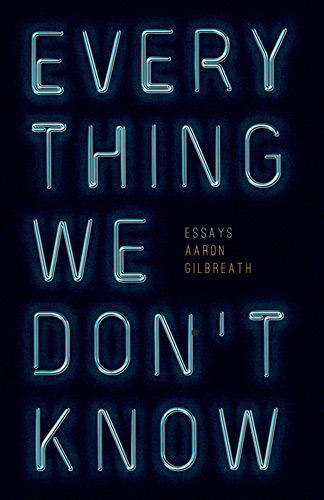Everything We Don’t Know
Aaron Gilbreath’s book of essays, Everything We Don’t Know, posed a dilemma as I was trying to determine the audience for it. Taking the title at face value, I expected to find fresh ideas about people, places, and, of course, things. His first few essays appear as a memoirish charting of his drug addiction. Not really on my list of wanting-to-know-abouts. But before long, Gilbreath turns his focus to other subjects and fulfills my expectations.
Aaron Gilbreath’s book of essays, Everything We Don’t Know, posed a dilemma as I was trying to determine the audience for it. Taking the title at face value, I expected to find fresh ideas about people, places, and, of course, things. His first few essays appear as a memoirish charting of his drug addiction. Not really on my list of wanting-to-know-abouts. But before long, Gilbreath turns his focus to other subjects and fulfills my expectations.
In 2006, when Gilbreath was 31, he left his Portland, Oregon, job in customer service at Powell’s Books to live in New York City and intern at a publicity company. In “My Manhattan Minute,” we learn that his real aim was to write:
Who knows how these mythic notions colonize your head. [ . . . ] But leaving quiet, arty, affordable Portland and casting myself from the repetitive retail bottom of the publishing food chain to work the production end, I held what I considered informed, but what were in fact vague, notions of that future career . . . .
He candidly expands on this: “Meaning, I wanted to work in some sort of creative, editorial, literary capacity. ‘Capacity,’ it turned out, was code for ‘I’m clueless.’”
The publicity assistant job he was shooting for didn’t pan out, but he did reach his goal of “to write,” as proven by his many essays and articles that appear in national publications and literary magazines, and are listed as notables in Best American Essays 2011 and 2013. Everything We Don’t Know showcases his writing skills in one collection.
The essay titled “Ancient History” is an observation of family, in particular, Gilbreath’s 61-year-old Uncle Sheldon who possesses a legendary memory and exudes eccentricities. Gilbreath explains, bringing him to life for readers: “Sheldon isn’t married, has no kids, few friends and no mortgage. With so little to clutter his mind, it’s as if life demands only a fraction of his cognitive capacity.” Sheldon refuses to wear a needed hearing aid, hugs people instead of shaking hands, veers off into subjects apropos of nothing, and stole Grandpa Shapiro’s jewelry the day Grandpa died.
Moving from family to neighbors, in “Tragedy of the Commons” Gilbreath is living in an apartment building in Portland, and among the tenants is the memorable Chad. Again Gilbreath vividly describes this person, allowing readers to picture this neighbor:
He taped a rotating collection of fliers to his door [ . . . ] which served, as I interpreted it, as both a to-do list for folks not reading the local weeklies and a public sampling of his personal tastes. [ . . . ] The objects he set on his welcome mat seemed equally haphazard: a bird cage, [ . . . ] a plastic Halloween pumpkin, or a pile of fallen acorns, maple or elm branches thick enough to call logs, a copper gecko . . . .
“I wondered,” writes Gilbreath, “if contemporary art could be this arbitrary. If I were a critic, my review of Chad’s exhibit would’ve read: ‘Accidental, capricious, deliberately indiscriminate.’”
Then there’s his animal friend. Wiggy is the pet ferret he celebrates in “It’s Really Something You Should Have Examined.” Wiggy pees all over everything, to the chagrin of Gilbreath’s then girlfriend Abby while they’re living in New York City. Here’s a telling description of the author’s feelings about Wiggy:
When he got lonely, he’d find you and coil up nearby. When he wanted to be alone, he crawled inside the couch and emerged when he was ready. Back in Oregon, I had perfected this lifestyle: read, hike, eat, try and fail to forge a romantic relationship, then go back to my cave to read, hike and eat. All I could do now was supply Wiggy the essentials for continuing that life.
This left me in a strange situation. I was living vicariously through a weasel.
But getting back to the book’s title, Everything We Don’t Know, the piece that most impressed me is the one that triggered it. The titular essay, delves into Japan’s 2012 Fukushima nuclear disaster. Perhaps I found this to be his best essay because I’d just finished reading Svetlana Alexievich’s book Voices from Chernobyl about the 1986 Russian nuclear reactor accident, the two reading experiences connecting.
In Gilbreath’s book he reminds us what caused the 2012 disaster: “The 9.0 Tōhoku earthquake that struck Japan’s east coast killed nearly 16,000 people and unleashed a tsunami that decimated towns and washed between four and eight million tons of debris into the Pacific Ocean.” Among the astounding debris that made its way toward the North American coast was an unmanned shrimp boat and a 66-foot cement dock that was kept afloat by its Styrofoam filling.
Though I was initially put off by the first pieces in this book, that doesn’t discount the value of these essays. Aaron Gilbreath’s life is obviously his own best subject, and for our reading enlightenment, he fearlessly shares his experiences, opinions, and philosophies in Everything We Don’t Know.





